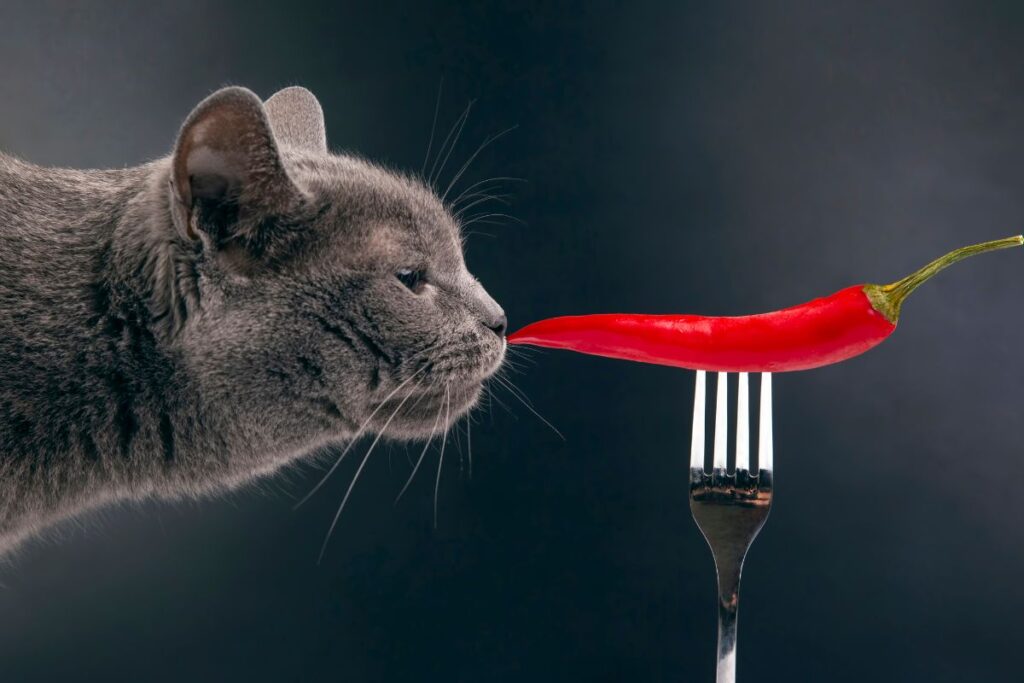If you’ve ever wondered whether your feline friend can experience a spicy taste sensation, you’re not alone. While it’s common knowledge that cats are predominantly carnivorous creatures with a preference for meat-based dishes, it’s less well-known how they respond to the variety of flavors and spices sometimes present in their food. In this article, we’ll explore the science behind cats’ ability to taste spicy and see if we can uncover any potential dangers associated with feeding your cat spicy foods.
Cats and Their Unique Taste Buds
The answer to whether cats can taste spicy lies in understanding the feline palate and its abilities. Unlike humans, who possess up to 10,000 taste buds, cats have approximately 470. This reduced number means that their sense of taste is more limited. As obligate carnivores, these creatures are primarily driven by aroma, which explains why a strong-smelling dish might prove irresistible.
Cats are known to be deficient in certain receptors needed for tasting sweet flavors, meaning that sugar has no effect on them. The phenomenon is referred to as ‘sweet blindness’. However, when it comes to spiciness, the picture becomes slightly more complicated. It is believed that capsicum, the compound responsible for spice in various peppers, may still stimulate chili-sensitive nerves in a cat’s mouth and the surrounding tissue, producing a response from the animal.
Spicy Foods and Potential Dangers for Felines
While the question of whether cats can taste spicy or not leans towards a minimal taste sensation caused by capsaicinoids like capsicum, there are different aspects to consider before indulging your pet’s curiosity about such foods. For instance, many hot sauces and spicy dishes contain other ingredients that might be harmful or even toxic to cats.
Detrimental Ingredients
Some essential ingredients found in many spicy foods can have negative impacts on feline health. For example, garlic and onions contain compounds called thiosulphates, which can cause hemolytic anemia, a serious blood condition, if consumed by cats. Additionally, high sodium content often associated with spicy dishes can pose risks to cats, such as hypertension, kidney damage, or fluid retention.
Gastrointestinal Distress
As sensitive creatures, cats don’t tolerate spicy substances well. When fed hot or spicy foods, they are more likely to experience gastrointestinal distress. This can manifest as symptoms like vomiting, diarrhea, or abdominal pain. Some spices or herbs, like cinnamon or oregano, can prevent proper digestion by causing irritation in the cat’s digestive tract or injuring their digestive organs.
Best Practices for Feeding Cats
In the wild, domesticated cats predominantly consume protein from birds, rodents, and insects, ensuring that their nutritional needs are met. Consequently, their ideal diet is minimal in carbohydrates and unsubstantial in spices. To provide them with the best possible nourishment:
- Offer protein-rich meals: Ensure you’re feeding your cat meals comprising high-quality animal proteins like poultry, meat, or fish. This caters to its obligate carnivore nature.
- Avoid human food: Many human meals may contain harmful elements for cats. As a result, they may increase the potential of toxicity or choking hazards, particularly when flavorsome.
- Select specially-formulated cat foods: Commercially-sold cat foods are created to cater to the specific nutritional needs of feline pets. They are generally safe and nutritionally balanced for everyday consumption.
It is essential to remember that individual cats may react differently to various food items, including spicy foods. While some may appear indifferent, others might indeed show an aversion or even discomfort after ingesting such flavors. Overall, it’s best to adhere to a cat-friendly diet, avoiding potentially harmful or distressing ingredients. This guarantees your feline companion stays healthy and content.

